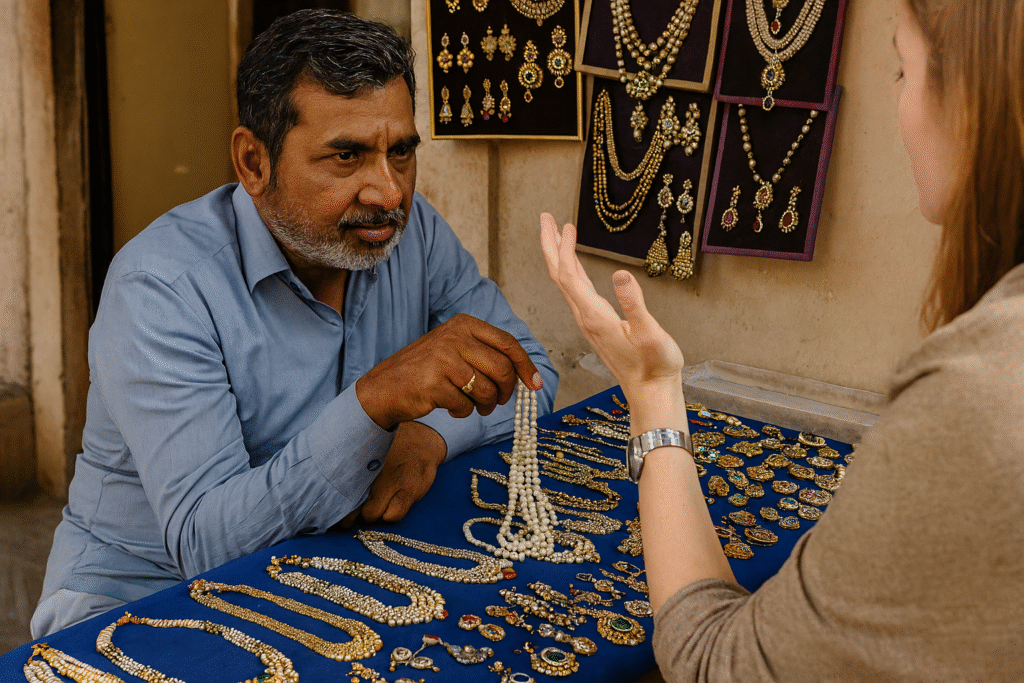Bargaining for jewelry in Jaipur is part of the shopping experience. If you don’t haggle, you risk overpaying. If you haggle too hard, you risk offending the seller. The key is finding a respectful middle ground.
This guide shows you how to negotiate effectively in Jaipur’s famous jewelry bazaars, from Johari Bazaar to Tripolia, while saving money and maintaining goodwill.
Step 1: Know the Market Before You Bargain
Tourists who skip this step often end up paying 20–40% more than locals.
Research average jewelry prices online.
Ask locals what fair rates are for silver, gold, or gemstone jewelry.
👉 “Check average prices online before you enter the market. Also read our guide on Understanding BIS Hallmark: What It Means for Your Jewellery to identify authentic pieces.”
Step 2: Start Low, Stay Polite
- Begin with an offer 30–40% lower than the asking price.
- Keep a friendly tone and smile.
- The key is to show interest while leaving room for the seller to meet you halfway.
👉 If you are considering gold purchases, our post 24K, 22K, 18K: What Every Malayali Gold Buyer Must Know helps you compare purity levels.
Step 3: Use Silence and Walking Away
- If the seller resists, pause before countering.
- Walking away politely often brings a better offer.
- Case study: A traveler in Jaipur saved ₹4,500 on a silver necklace using this tactic.
👉 “Travelers who also want to avoid diamond scams can check Certified Stones Only: How to Avoid Overpaying for Diamonds.
Step 4: Recognize When the Price is Fair
- Some gemstone jewelry has less room for bargaining.
- If the seller stands firm, it often means the item is close to its real value.
- Building rapport now may lead to discounts later.
👉 Learn more about here: Jaipur Tourism Official Website
Q&A
Q: Is bargaining for jewelry in Jaipur rude?
A: No. Sellers expect it, but they value politeness.
Q: What’s a realistic discount?
A: Aim for 20–30%, depending on the material.
Q: How do I know when to stop haggling?
A: If the seller insists, the price is likely fair for the quality.
Quotable Insights
- “The key to bargaining for jewelry in Jaipur is knowing when to smile, when to pause, and when to walk away.”
- “Research shows polite haggling saves tourists up to 30% in Jaipur jewelry markets.”
👉 See our Gold Buying Checklist for Malayalis.
Introduction
This Responsible Travel FAQ provides comprehensive answers to help you make ethical tourism choices.
Our guide covers eco-friendly accommodations, local community support, sustainable transportation, cultural respect, wildlife ethics, and ways to reduce waste.
Following these practices ensures your adventures benefit both destinations and travelers.
What is Responsible Travel and Why Does It Matter?
Responsible travel means making conscious choices that minimize negative impact while maximizing benefits for local communities and the environment.
Tourism generates $1.4 trillion annually but produces 8% of global carbon emissions.
Your travel decisions affect local economies, cultural preservation, and environmental conservation.
How Do I Choose Sustainable Accommodations?
Look for eco-certifications such as:
- Green Key
- LEED building standards
- EarthCheck approval
- Rainforest Alliance verification
Check if hotels use renewable energy, water-saving systems, and source food locally.
Ask about waste reduction programs and community involvement. Calling properties directly helps verify claims.
Transportation Options for Responsible Travel
- Train travel emits 80% less carbon than flying for similar distances.
- Choose direct flights when necessary and book economy class.
- Use public transport, bicycles, or walk instead of renting cars.
- Consider verified carbon offsets for unavoidable flights.
Supporting Local Economies
- Buy from locally-owned businesses instead of chains.
- Book community-based tours with local guides.
- Eat at family-owned restaurants with local ingredients.
- Stay in homestays or boutique hotels rather than international chains.
- Purchase authentic handicrafts fairly from artisans.
Packing Tips for Responsible Travel
- Reusable water bottle with filtration
- Solid toiletries to reduce plastic
- Reef-safe mineral sunscreen
- Reusable shopping bags
- Bamboo or metal utensils
- Portable laundry soap
Pack light and choose durable, multipurpose items.
Respecting Local Cultures
- Learn cultural customs, dress codes, and etiquette.
- Learn basic local phrases.
- Dress appropriately for religious and conservative areas.
- Ask permission before photographing people.
- Participate respectfully in cultural activities.
Ethical Wildlife Encounters
- Maintain safe distances and avoid feeding animals.
- Choose conservation-focused sanctuaries, not entertainment attractions.
- Avoid elephant rides, direct contact, or photo opportunities with captive animals.
- Use certified naturalist guides who prioritize welfare and habitat protection.
Reducing Waste During Travel
- Use reusable containers, bags, and utensils.
- Refuse single-use plastics.
- Choose digital tickets and receipts.
- Carry a small trash bag where disposal is limited.
Questions to Ask Tour Operators
- Are staff local and fairly paid?
- How does your business give back to communities?
- What environmental practices are in place?
- Are group sizes limited to reduce pressure on sensitive areas?
- Are wildlife experiences ethical and conservation-focused?
Money and Overtourism Practices
- Use local ATMs and tip according to local customs.
- Support social enterprises and cooperatives.
- Visit during shoulder seasons, off-peak hours, or lesser-known areas.
- Stay longer in fewer destinations.
Responsible Travel on a Budget
- Cook using local market ingredients.
- Use public transportation.
- Stay in local hostels, guesthouses, or homestays.
- Explore free cultural events or walking tours.
- Exchange skills or volunteer for free accommodation.
Pre-Travel Research
- Learn about environmental challenges and cultural sensitivities.
- Check seasonal weather and political situations.
- Identify local organizations to support.
- Read destination-specific responsible travel guides.
Creating a Positive Impact Post-Travel
- Share authentic stories on social media.
- Write detailed reviews for responsible businesses.
- Continue supporting local organizations.
- Apply sustainable practices in daily life.
- Recommend responsible travel to others.
Learn more:

